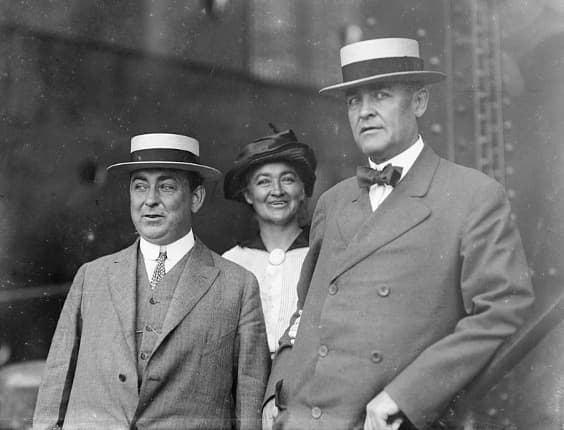Sullivan’s Follies, I: The Iron Pipeline Begins
The day New Yorkers started going to New Jersey to purchase their handguns.

The Supreme Court is getting ready to rule in a Second Amendment case in which the justices could — this is not a prediction — strike down New York’s 111-year-old Sullivan Act. It has long been criticized as a de facto handgun ban, and even before the law went into effect, The New York Sun was onto the story.
“The harmless looking person who steals to the rail of a ferryboat and drops a glittering object in the river is probably not an anarchist disposing of a bomb but a law abiding citizen trying to get rid of a revolver which has been in bureau drawer for years as protection against burglars,” read the story headlined from August 29, 1911.
“Throw Away Your Pistol,” read the headline. People were also initially confused by the implementation of the law, as evidenced by “That Weapon Law,” a dispatch issued in the Sun on the day the Sullivan Act became effective. “They were supplied with large bundles of copies of the law,” a September 1, 1911, dispatch reads.
“That the new law contains some puzzling features was discovered by one man who sought an official ruling on the measure,” the Sun reported. That was the beginning of three years of growing skepticism in respect of the Sullivan Act, a review of the Sun’s coverage by the current staff has found.
In a July 1914 editorial, the Sun observed how “the Sullivan law sent the ‘gunmen’ to New Jersey for their armament,” suggesting that New Yorkers were defying the law and crossing the Hudson to buy guns.
This loophole in the Sullivan Law — people traveling to New Jersey to buy guns — provided what might be called an early glimpse of what police now call the “iron pipeline.” That term refers to gun smuggling within the United States from states with looser regulation on the sale of guns.
Another Sun article, published on August 3, 1919, was headlined, “How War Jolted the Sullivan Law.” The article notes that thousands of veterans had returned from World War I with the firearms they had used in the fighting abroad.
The Sun noted that the law “did not stop gang shootings nor did it stop the acquisition or ownership of firearms.” Worse, it had been, according to the Sun, “used illegitimately by police.”
“A few unfortunate citizens,” the Sun reported, “against whom somebody with influence had a grudge were arrested on trumped up charges.” When these individuals were searched by police, they “were found to have one or more revolvers in their possession. It made no difference whether the revolvers were in those pockets when the man was arrested.”
Yet the guns “were there when he was searched,” the article says. “He was guilty of a violation of the Sullivan law.” The law, the Sun continued, if “nothing else it made the acquisition of a revolver rather harder of an accomplishment and gunmen were a trifle chary of toting their artillery about the streets.”
The return of veterans from the Western Front, the Sun concluded, had given the Sullivan Law a “considerable jolt.”
More recently, the Sun has reported that the politically influential and wealthy are more likely to receive permits, particularly due to the high fees required in the application process.
“The New York Sun received an official list of New Yorkers who have gun permits. The list includes Donald Trump, Donald Trump Jr., Robert DeNiro, and Ronald Lauder, among others,” Christopher Faherty wrote in a Sun dispatch in 2007.
“If you’re a plain Joe or Jane, you’re out of luck, and they’re the people who really need protection,” a National Rifle Association spokesman, Andrew Arulanandam, said then.
In recent years, the Sun has carried forward its record of skepticism toward the Sullivan Law. It has argued in editorials that the law has become so strident that the Second Amendment essentially doesn’t exist in New York.
The paper has said it would not support any further restrictions on guns anywhere in America until Craig Whitney can carry a pistol in New York. Mr. Whitney is a retired editor of the New York Times who is a Navy veteran who served in Vietnam, where he carried a pistol.
In the Navy, he was trained to use a pistol. He has lived such a law-abiding life since then that he’s never had even a speeding ticket. Yet, frustrated that he would need a permit to carry a pistol, he wrote a book on the topic.
It questions why New York requires its subjects to get a permit to exercise their rights under the Second Amendment when it doesn’t require them to get a permit to pray or edit a newspaper under the protection of the First Amendment.

